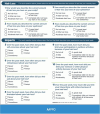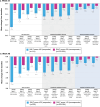Patient-Reported Hair Loss and Its Impacts as Measured by the Alopecia Areata Patient Priority Outcomes Instrument in Patients Treated with Ritlecitinib: The ALLEGRO Phase 2b/3 Randomized Clinical Trial
- PMID: 39441519
- PMCID: PMC11742000
- DOI: 10.1007/s40257-024-00899-4
Patient-Reported Hair Loss and Its Impacts as Measured by the Alopecia Areata Patient Priority Outcomes Instrument in Patients Treated with Ritlecitinib: The ALLEGRO Phase 2b/3 Randomized Clinical Trial
Abstract
Background: The ALLEGRO phase 2b/3 study investigated the efficacy and safety of ritlecitinib in patients with alopecia areata (AA).
Objective: To describe the impact of ritlecitinib on patient-reported hair loss using the Alopecia Areata Patient Priority Outcomes (AAPPO) instrument and evaluate the relationship between clinically meaningful hair regrowth and improvements in patient-reported impacts.
Methods: In ALLEGRO-2b/3, patients aged ≥ 12 years with AA and ≥ 50% scalp hair loss received once-daily ritlecitinib 50 or 30 mg (± 4-week 200-mg daily loading dose), 10 mg, or placebo for 24 weeks and then continued ritlecitinib or switched from placebo to ritlecitinib 200/50 or 50 mg for 24 weeks. The AAPPO instrument evaluated improvement in hair loss, emotional symptoms (ES), and activity limitations (AL) from weeks 4 to 48 (secondary endpoint). Mean changes in ES and AL domain scores and individual items at weeks 24 and 48 were calculated for Severity of Alopecia Tool (SALT) score ≤ 20 responders and nonresponders (exploratory endpoint).
Results: Overall, 718 patients were randomized. At week 24, 5-36% of patients receiving ritlecitinib 10-200/50 mg reported improvement in scalp hair loss versus 9% receiving placebo. The results for eyebrow, eyelash, and body hair loss were similar. Mean change from baseline in ES and AL scores at weeks 24 and 48 was small and similar between groups. Mean change was larger for individual hair loss and ES items at weeks 24 and 48 in SALT score ≤ 20 responders versus nonresponders.
Conclusions: The AAPPO instrument demonstrated the beneficial impact of ritlecitinib on patient-reported hair growth, which was consistent with improvements in clinician-reported outcomes.
Clinical trial registration: NCT03732807. INFOGRAPHIC.
© 2024. The Author(s).
Conflict of interest statement
Declarations. Funding: This study was funded by Pfizer Inc. The sponsor, Pfizer Inc, was involved in the design and conduct of the study; collection, management, analysis, and interpretation of the data; and preparation, review, and approval of the manuscript for publication. Medical writing and editorial support provided by Nucleus Global were funded by Pfizer Inc. Conflict of interest: R.S. reports professional services for AbbVie, Acrotech, Amgen, Arena, Arcutis, Aksebio, AstraZeneca, Ascend, Bayer, Boehringer Ingelheim, Bristol Myers Squibb, Celgene, Coherus BioSciences, Cutanea, Connect, Demira, Eli Lilly, Galderma, GSK, Janssen, LEO Pharma, MedImmune, Merck, MSD, Novartis, Oncobiologics, Pfizer, Regeneron, Reistone, Roche, Sanofi, Samson Clinical, SUN Pharma, and UCB. N.M. reports professional services for AbbVie, Arena Pharmaceuticals, Bristol Myers Squibb, Concert Pharmaceuticals, Eli Lilly, La Roche-Posay, and Pfizer. D.M., D.W., E.H.L., and R.W. are employees of or hold stock or stock options in Pfizer Inc. B.K. has received honoraria and/or consultation fees from AbbVie, AltruBio, Almirall, AnaptysBio, Arena Pharmaceuticals, Bioniz Therapeutics, Bristol Meyers Squibb, Concert Pharmaceuticals Inc, Equillium, Horizon Therapeutics, Eli Lilly and Company, Incyte, Janssen Pharmaceuticals, LEO Pharma, Otsuka/Visterra Inc, Pfizer Inc, Regeneron, Sanofi Genzyme, TWi Biotechnology Inc, and Viela Bio. He has previously served on speaker bureaus for AbbVie, Incyte, Eli Lilly, Pfizer, Regeneron, and Sanofi Genzyme. Data availability: Upon request, and subject to review, Pfizer will provide the data that support the findings of this study. Subject to certain criteria, conditions, and exceptions, Pfizer may also provide access to the related individual deidentified participant data. See https://www.pfizer.com/science/clinical-trials/trial-data-and-results for more information. Ethics approval: This study was approved by the institutional review boards or ethics committees of the participating institutions. The study was conducted in accordance with the general principles set forth in the International Ethical Guidelines for Biomedical Research Involving Human Subjects (Council for International Organizations of Medical Sciences 2002), ICH Guideline for Good Clinical Practice, and the Declaration of Helsinki. Consent to participate: Written informed consent was obtained from each patient, parent, or the patient’s legal representative. Consent to publish: Not applicable. Code availability: Not applicable. Author contributions: E.H.L. had full access to all of the data in the study and takes responsibility for the integrity of the data and the accuracy of the data analysis. All authors read and approved the final manuscript. Conceptualization: D.M., D.W., E.H.L., R.W. Data curation: R.S., N.M., D.M., D.W., E.H.L, R.W., B.K. Writing—original draft: E.H.L. Writing—review and editing: R.S., N.M., D.M., D.W., E.H.L., R.W., B.K. Formal analysis: D.W.
Figures




References
-
- United States Food and Drug Administration. Patient-focused drug development public meeting for alopecia areata. 2017. Accessed 4 Apr 2024.
Publication types
MeSH terms
Associated data
Grants and funding
LinkOut - more resources
Full Text Sources
Medical

